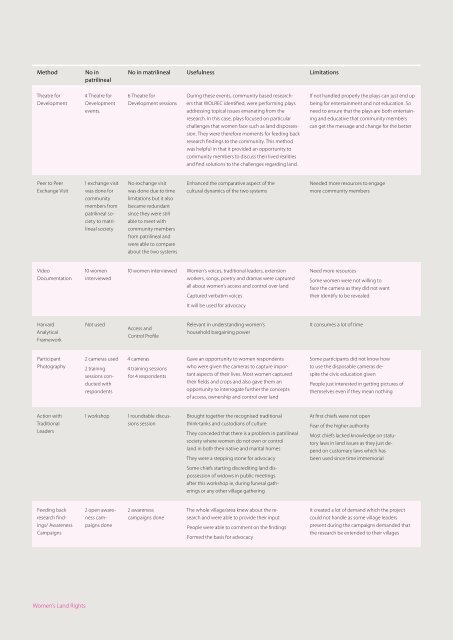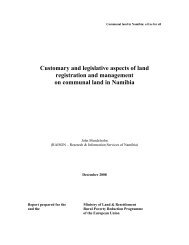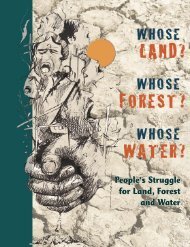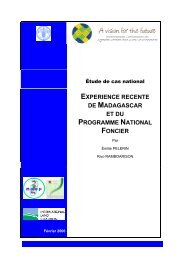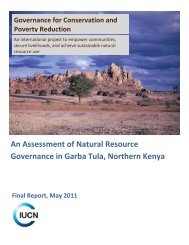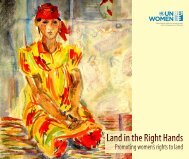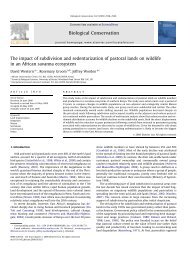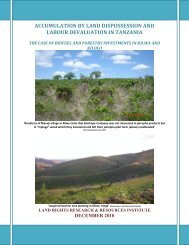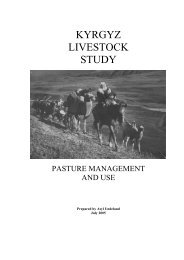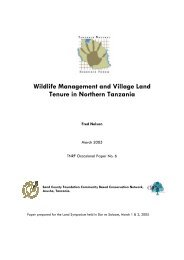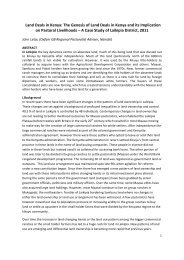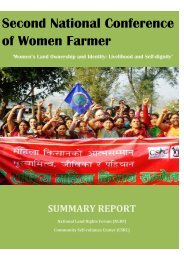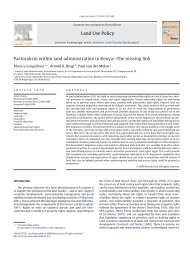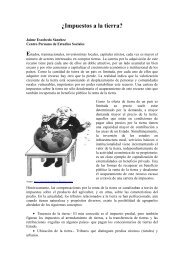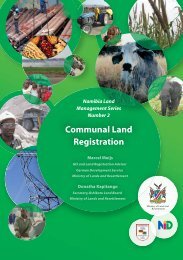Women's access to land and household bargaining power
Women's access to land and household bargaining power
Women's access to land and household bargaining power
Create successful ePaper yourself
Turn your PDF publications into a flip-book with our unique Google optimized e-Paper software.
Method No in<br />
patrilineal<br />
Theatre for<br />
Development<br />
Peer <strong>to</strong> Peer<br />
Exchange Visit<br />
Video<br />
Documentation<br />
Harvard<br />
Analytical<br />
Framework<br />
Participant<br />
Pho<strong>to</strong>graphy<br />
Action with<br />
Traditional<br />
Leaders<br />
Feeding back<br />
research findings/<br />
Awareness<br />
Campaigns<br />
Women’s L<strong>and</strong> Rights<br />
4 Theatre for<br />
Development<br />
events.<br />
1 exchange visit<br />
was done for<br />
community<br />
members from<br />
patrilineal society<br />
<strong>to</strong> matrilineal<br />
society<br />
10 women<br />
interviewed<br />
Not used<br />
2 cameras used<br />
2 training<br />
sessions conducted<br />
with<br />
respondents<br />
No in matrilineal Usefulness Limitations<br />
6 Theatre for<br />
Development sessions<br />
No exchange visit<br />
was done due <strong>to</strong> time<br />
limitations but it also<br />
became redundant<br />
since they were still<br />
able <strong>to</strong> meet with<br />
community members<br />
from patrilineal <strong>and</strong><br />
were able <strong>to</strong> compare<br />
about the two systems<br />
During these events, community based researchers<br />
that WOLREC identified, were performing plays<br />
addressing <strong>to</strong>pical issues emanating from the<br />
research. In this case, plays focused on particular<br />
challenges that women face such as <strong>l<strong>and</strong></strong> dispossession.<br />
They were therefore moments for feeding back<br />
research findings <strong>to</strong> the community. This method<br />
was helpful in that it provided an opportunity <strong>to</strong><br />
community members <strong>to</strong> discuss their lived realities<br />
<strong>and</strong> find solutions <strong>to</strong> the challenges regarding <strong>l<strong>and</strong></strong>.<br />
Enhanced the comparative aspect of the<br />
cultural dynamics of the two systems<br />
10 women interviewed Women’s voices, traditional leaders, extension<br />
workers, songs, poetry <strong>and</strong> dramas were captured<br />
all about women’s <strong>access</strong> <strong>and</strong> control over <strong>l<strong>and</strong></strong><br />
Captured verbatim voices<br />
It will be used for advocacy<br />
Access <strong>and</strong><br />
Control Profile<br />
4 cameras<br />
4 training sessions<br />
for 4 respondents<br />
1 workshop 1 roundtable discussions<br />
session<br />
2 open awarenesscampaigns<br />
done<br />
2 awareness<br />
campaigns done<br />
Relevant in underst<strong>and</strong>ing women’s<br />
<strong>household</strong> <strong>bargaining</strong> <strong>power</strong><br />
Gave an opportunity <strong>to</strong> women respondents<br />
who were given the cameras <strong>to</strong> capture important<br />
aspects of their lives. Most women captured<br />
their fields <strong>and</strong> crops <strong>and</strong> also gave them an<br />
opportunity <strong>to</strong> interrogate further the concepts<br />
of <strong>access</strong>, ownership <strong>and</strong> control over <strong>l<strong>and</strong></strong><br />
Brought <strong>to</strong>gether the recognised traditional<br />
think-tanks <strong>and</strong> cus<strong>to</strong>dians of culture<br />
They conceded that there is a problem in patrilineal<br />
society where women do not own or control<br />
<strong>l<strong>and</strong></strong> in both their native <strong>and</strong> marital homes<br />
They were a stepping s<strong>to</strong>ne for advocacy<br />
Some chiefs starting discrediting <strong>l<strong>and</strong></strong> dispossession<br />
of widows in public meetings<br />
after this workshop ie, during funeral gatherings<br />
or any other village gathering<br />
The whole village/area knew about the research<br />
<strong>and</strong> were able <strong>to</strong> provide their input<br />
People were able <strong>to</strong> comment on the findings<br />
Formed the basis for advocacy<br />
If not h<strong>and</strong>led properly the plays can just end up<br />
being for entertainment <strong>and</strong> not education. So<br />
need <strong>to</strong> ensure that the plays are both entertaining<br />
<strong>and</strong> educative that community members<br />
can get the message <strong>and</strong> change for the better<br />
Needed more resources <strong>to</strong> engage<br />
more community members<br />
Need more resources<br />
Some women were not willing <strong>to</strong><br />
face the camera as they did not want<br />
their identify <strong>to</strong> be revealed<br />
It consumes a lot of time<br />
Some participants did not know how<br />
<strong>to</strong> use the disposable cameras despite<br />
the civic education given<br />
People just interested in getting pictures of<br />
themselves even if they mean nothing<br />
At first chiefs were not open<br />
Fear of the higher authority<br />
Most chiefs lacked knowledge on statu<strong>to</strong>ry<br />
laws in <strong>l<strong>and</strong></strong> issues as they just depend<br />
on cus<strong>to</strong>mary laws which has<br />
been used since time immemorial<br />
It created a lot of dem<strong>and</strong> which the project<br />
could not h<strong>and</strong>le as some village leaders<br />
present during the campaigns dem<strong>and</strong>ed that<br />
the research be extended <strong>to</strong> their villages


